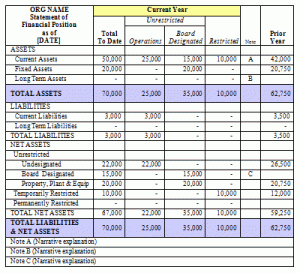How AI can transform the way accountants work for the better
![]()

The AI technologies referenced in this article should not be confused with generative AI tools such as ChatGPT (see the sidebar “What Is AI?” at the bottom of this article). Now that you understand how to leverage AI in accounting, all that’s left to do? Get out there, explore generative AI, and experiment with ways to make AI work in your business. Midjourney is a generative AI tool that uses written prompts to create custom images. Type in your prompt and within seconds you’ll have multiple options to choose from. “What will help most people who are new to AI and ChatGPT…will be learning how to write good prompts,” says Kenji.
The effects of GenAI on tax firm rates
The platform aims to provide these firms with intelligent technology that will free up time they currently spend on many low-value, tedious, day-to-day tasks, the company said in a Thursday (June 20) press release. Users also gain access to Divvy From Bill, an automated credit and expense management software, at no extra charge. Divvy offers lines of credit up to $15 million and tools to help control budgets and manage spending. Learn to increase the efficiency, effectiveness, and quality of your risk assessment procedures as required under SAS No. 145 by using technology and automated tools and techniques. Firms looking to incorporate AI tools into their audit processes would be wise to anticipate the unexpected when it comes to the quality of client data. However, Cheek believes that an efficient audit is based on enhanced planning and better use of finite resources.
Data collection and ingestion
For instance, it may not be able to handle complex financial scenarios that require human judgment. Also, there’s a risk of data breaches if the software doesn’t have robust security measures in place. AI accounting software is not just a trend; it’s a powerful tool that’s here to stay. It’s transforming the accounting landscape, making it more accessible, efficient, and reliable.
Bill Pricing Plans
To gain a deeper understanding of AI’s impact on the profession, IMA engaged global experts in the field and accounting and finance leaders to study the applications of AI, as well as the challenges of integrating it with management accounting work. AI-powered tax software enables accountants to work smarter and faster, and more easily shift away from a compliance base in favor of higher-value, strategic services. IBM Consulting’s F&A practitioners can partner with you as you roll out this technology, sharing valuable insights and best practices along the way. In 2023 alone, IBM Consulting has interacted with more than 100 clients and completed dozens of engagements infusing generative AI alongside classical machine learning AI strategies. Explore more posts in this blog series, The Future of Finance with Generative AI, to learn more about how to streamline and enhance critical F&A functions and improve your finance operation’s efficiency with generative AI.
Merlini met the company’s Chief Technology Officer Lucas Adams while working at Facebook, under parent company Meta Platforms Inc., where they worked together building AI systems to parse and understand journalism content. During his work, Kevin reflected on his earlier work with the Big Four accounting firm KPMG LLP and how much of it could have been lightened by the use of AI. This led to the pair incubating the concept at AI2 Incubator in 2022, a few months before the debut of OpenAI’s popular chatbot ChatGPT. The company already works with top national firms, and the feedback from these customers has been “overwhelmingly positive,” Natalie Sandman, a general partner at Spark Capital, which led the funding, said in the release. Use Gridlex Sky to oversee all accounting, expense management, and ERP functions with customizable automations and AI-driven insights. Sky can handle invoicing, billing, payroll, general ledger management, and more.

Brian is the US Audit & Assurance Trustworthy AI leader with diverse experience providing audit and advisory services to Fortune 500 companies. A leader who brings strong technical, risk management, communication, and organizational skills, he focuses on providing audit, accounting, and advisory services to public and private companies in the financial services sector. Brian is also leading Deloitte’s efforts in the Algo/AI assurance area as emerging technologies continue to impact clients and the marketplace. Brian received a BS in Accountancy and BS in Business Administration from Villanova University. AI accounting software is a powerful tool that’s transforming the financial industry.
AI is used in accounting to automate time-consuming and repetitive tasks such as data entry, bookkeeping, and financial analysis. The technology can be used to analyze large datasets and identify patterns and anomalies that could be overlooked by human accountants. AI also enables accountants to provide more accurate and timely financial insights to clients and stakeholders. Docyt, pronounced “docket”, is an integrated, AI-powered accounting automation software platform.
Plus, Gartner found that 80% of CFOs expect to spend more on AI in the coming two years. In this new era of AI, you may have heard whispers of job replacement or the end-to-end automation of all human processes. Materia believes that a solution that helps provide a better day-to-day experience for accountants, along with secure, accurate answers will provide relief for this looming issue. This hub is https://www.kelleysbookkeeping.com/how-journal-entries-for-the-imprest-petty-cash/ then leveraged by the Materia AI Assistant and Document Analysis Workspace, which use the data to deliver reliable data based on proprietary knowledge and authoritative accounting standards, the release said. It was Martin Wygas, Founding Partner of Axiom Equity, who saw the potential for more acceleration of AccountsIQ’s product development with additional capital and expertise injected into it.
- DTTL and each of its member firms are legally separate and independent entities.
- Let’s say a prospective client has questions about your accounting services.
- DTTL (also referred to as “Deloitte Global”) does not provide services to clients.
- Vic.ai is a process-oriented AI automation platform designed to help accountants streamline various workflows from invoice processing to payments.
- This tool has dramatically improved the efficiency and effectiveness of audits while reducing the risk of human error and ensuring a higher standard of compliance.
Then, based on your assessment, prioritize processes that stand to benefit the most from automation or AI augmentation. AI’s ability to perform this type of work means that 59% of accounting and bookkeeping professionals believe bookkeeping will be the most disrupted function by AI. And according to a study from Mordor Intelligence, artificial intelligence in accounting is projected to grow 30% year-over-year through 2027.

With the potential of data difficulties in mind, firms should consider the value of some clients and clarify their requirements for AI-powered audits. “You have to tell clients you expect them to operate at a certain level,” Logan said, or the client will face cost overruns. Artificial intelligence is transforming fiscal year and fiscal period the accounting industry by providing numerous benefits to accounting professionals. While there are many benefits to using AI, it will never be able to replace certain aspects of business accounting. For example, AI doesn’t have soft skills, like communication, problem-solving and critical thinking.
There’s also a rise in e-invoice automation, in which key invoice data is extracted to help automate the processing of invoices. Like many industries, the accounting profession is exploring how AI can improve efficiencies and help strained firms better serve clients. Underscoring this point, the most recent CPA.com and AICPA PCPS CAS Benchmark Survey found that 24 percent of top performing CAS practices are leveraging AI. AI is transforming traditional practices into dynamic and efficient systems.
While AI has evolved dramatically in recent months, the impact of technology on the accounting profession is nothing new. Learn how Gen AI can help you create new insights, solutions, and opportunities for yourself and your clients. “And that’s just the power of being able to https://www.wave-accounting.net/ synthesize that data and tell you exactly where to focus,” Vanover said. And the best thing you can do right now is to understand it and learn how best to use it. Sign up for a free account with ChatGPT or next-generation AI assistant Claude.ai and start asking questions.
ClickUp Accounting is a cloud-based business management software designed to simplify financial processes. Manage accounts, create shareable reports, and let ClickUp Brain act as your digital personal assistant so you can focus on the larger strategy. DARTbot is currently available to Deloitte’s nearly 18,000 US Audit & Assurance professionals to help quickly research complex accounting questions, drive efficiency, and provide a differentiated audit experience to clients. He expects that to change, however, as the firm standardizes its data ingestion process and can better stipulate what it needs to gather useful data. Planful (formerly Host Analytics) is a leading provider of scalable, cloud-based enterprise performance management (EPM) software solutions, designed specifically for enterprises. With Planful, users can seamlessly integrate realistic modeling data into operational and financial business plans, compare projections to outcomes, and collaborate with key stakeholders using a single, user-friendly interface.

Instead of committing to a time-consuming and expensive transition to a new ERP system, Docyt can simplify your back-office accounting operations at a fraction of the cost. By automating spend management and accounting workflows, Docyt can help you save time and money while improving the accuracy of your financial reporting. Several popular accounting software companies employ AI technology to enhance their operations, and this article provides an overview of how each of these companies utilizes AI in their platforms. AI-powered accounting software often requires access to sensitive financial data, making it a potential target for cyber-attacks and data breaches. Ensuring the security and privacy of financial data is a critical challenge that needs to be addressed. AI algorithms rely on accurate and high-quality data to make informed decisions.
These algorithms can learn from past transactions and improve their accuracy over time. AI-powered chatbots can also be used to provide customer support and respond to queries from clients and stakeholders. AI has had a significant impact on the accounting industry by automating numerous tasks and increasing efficiency. For example, AI can create invoices, analyze financial data, generate reports, and identify patterns and anomalies that suggest accounting fraud. These services can help businesses save money and improve their financial reports’ accuracy and timeliness.
